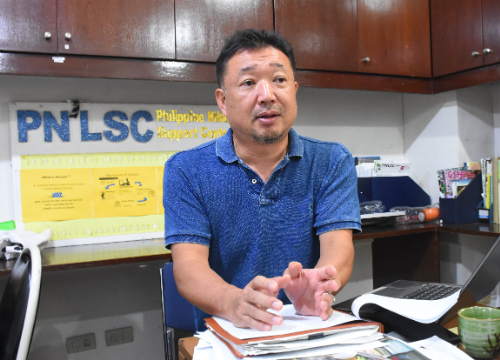Nikkei-Jins appear losing race vs time to recover Japanese Citizenship

Nikkei-jins or the children of Japanese nationals who migrated to the Philippines before or during World War II appear to be losing a race against time to recover Japanese citizenship because of legal requirements of the Philippine government.
In an interview with the Daily Manila Shimbun, Norihiro Inomata, Representative Director of Philippine Nikkei-jin Legal Support Center (PNLSC), a non-government organization helping Japanese descendants in the Philippines emphasized the importance of reducing the number of requirements needed by the Nikkei-jin in the Philippines.
He said among the requirements that are difficult to obtain by the Nikkei-jins are joint affidavits in birth for second generations and the joint affidavits in marriage of the first generations.
Inomata said the Office of the Civil Registrar of the local government units requires affidavits of two witnesses of both birth and marriage for the application of late birth or marriage registration certificate.
"Since they are very old and some have died, it's hard to look for witnesses. So we request to lessen the requirements because (it is no longer suitable) in the situation now," he said.
Inomata said the death rate of the second generation descendants has increased from less than a hundred to 100-150 per year since the declaration of COVID-19 pandemic in 2020.
Despite the increase of death rates since 2020, Inomata said there is no confirmation if most of the Nikkei-jins died due to COVID-19 since the usual cause of death of old people even before the pandemic is pneumonia which is also one of the symptoms of the coronavirus.
Other challenges experienced by the Nikkei-jins include their geographical locations where most of them live in remote areas, their financial status since they need to spend money to process and complete their requirements.
Inomata also stressed that some Nikkei-jins were having a hard time processing the paperworks because they were not able to finish their education due to the discrimination they experienced in school. Many Filipinos were angry and hostile towards those identified as children of Japanese as a result of the violence during the World War II.
In its latest survey, the Japan Ministry of Foreign Affairs (MOFA) recorded a total of 3,821 Nisei, of which 1,548 have acquired Japanese citizenship, while 1,780 have died, 151 were confirmed alive and 342 others whose status are still subject of confirmation.
Inomata said of the 151 living Nisei (the second generation), 76 of them "wish to recover their identity" as Japanese nationals.
He said most Nikkei-jins who want to recover their nationality are seeking to reunite with their families while others want their third up to fourth generations or grandchildren to have an opportunity to work in Japan.
Inomata also mentioned that there were 11 new cases of Nikkei-Jins also recorded in Western Visayas and Pampanga that are not yet included in the latest survey conducted by the MOFA.
One of the 11 new cases is from Pampanga, while six are in Roxas City in Capiz; two in Iloilo City, Iloilo; one in Guimaras and another one in Kalibo, Aklan.
Inomata said a 93-year-old Davao born Japanese national who is still looking for her younger brother and sister is expected to visit the country in August.
He said Miyagi Teruko was still hoping that her siblings Kiyoshi and Reiko were still alive after they were separated from them with their other family members when she together with her father and other siblings visited Japan before the war broke out in 1941. Robina Asido/DMS












